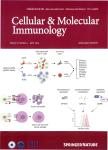Uncompromised NK cell activation is essential for virus-specific CTL activity during acute influenza virus infection
作者机构:Department of Pediatrics and Adolescent MedicineLi Ka Shing Faculty of MedicineThe University of Hong KongHong KongChina Medical Genetic CenterGuangdong Women and Children HospitalGuangzhou 511400China Department of RadiologyGeorgia Regents UniversityAugustaGA 30912USA GRU Cancer CenterGeorgia Regents UniversityAugustaGA 30912USA Department of PediatricsThe University of Hong Kong—Shenzhen HospitalShenzhen 518053China
出 版 物:《Cellular & Molecular Immunology》 (中国免疫学杂志(英文版))
年 卷 期:2018年第15卷第9期
页 面:827-837页
核心收录:
学科分类:0710[理学-生物学] 1004[医学-公共卫生与预防医学(可授医学、理学学位)] 1002[医学-临床医学] 1001[医学-基础医学(可授医学、理学学位)] 100214[医学-肿瘤学] 10[医学]
基 金:This work was supported in part by Research Fund for the Control of Infectious Diseases,Hong Kong SAR government(11100742) General Research Fund,Research Grants Council of Hong Kong(HKU 780113M,17121214,17115015) Area of Excellence program on Influenza(AoE/M-12/06) Theme-based Research Scheme from the Research Grants Council of the Hong Kong SAR,China(Project No.T11-705/14N) HKU Small Project Funding(201309176043)
摘 要:Natural killer (NK) cells are indispensable components of both the innate and adaptive immune response. However,their precise roles in the cross-talk between innate and adaptive immunity during influenza virus infection remaincontroversial. By comparing NK cell dynamics and activity under a sub-lethal dose and high dose of influenza virusinfection, we showed that influenza virus PR8 directly infected NK cells during natural infection, which wasconsistent with our previous findings obtained from an in vitro investigation of human NK cells. The impairments incytotoxicity and IFN-γ production by spleen NK cells following high-dose infection were accompanied by decreasedvirus-specific killing mediated by cytotoxic T lymphocytes (CTLs). Importantly, the weakened CTL activity could bereversed by adoptive transfer of spleen NK cells harvested from low-dose-infected mice but not healthy *** together, our data provide direct evidence supporting the contribution of NK cells to antiviral T-cellresponses. This study also indicates that a novel NK-targeted immune evasion strategy is used by influenza virusto shrink both innate and adaptive immune responses.



